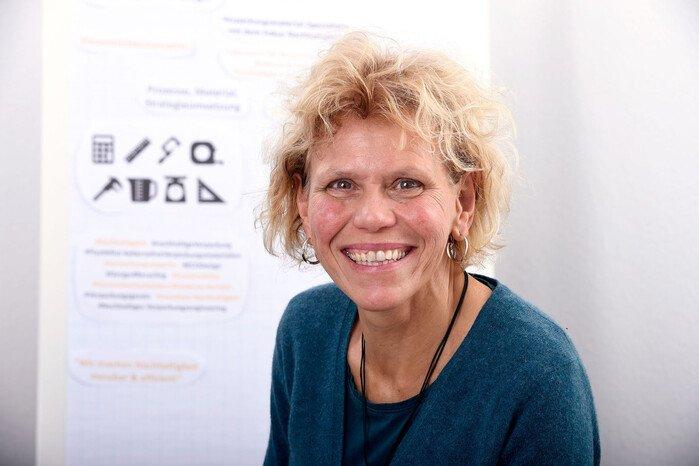Organic products are very much in favour with consumers. That was also clear from the growing popularity of the exhibition pairing of BIOFACH, the World’s Leading Trade Fair for Organic Food, and VIVANESS, the International Trade Fair for Natural and Organic Personal Care. In 2020, both of these events set records for exhibitor numbers, exhibition space and international attendance, when 3,792 exhibitors from 110 countries presented their products and services to more than 47,000 visitors at the Exhibition Centre Nuremberg from 12 to 15 February. This year, sustainable alternatives to traditional packaging materials and reducing the amount of packaging used were among the most important trends for the sectors represented there.
That was one of the reasons why packaging expert and sustainability specialist Carolina Schweig was invited by the trade fair organizers to report on more environmentally friendly packaging solutions and correct a few myths regarding sustainability. After all, the organic sector has to deal with the same questions of environmentally friendly packaging as conventional manufacturers. Although there is still some room for improvement, Schweig is positive: “The will is there, and it just needs to be guided in the right direction!” Then, the organic sector, with its customers and their expectations, and the margins it can achieve in this area, could lead the way with the sensible use of organic plastics, for example. Schweig also notes that Europe’s organic sector could play a crucial role with regard to target recycling rates if it paid rigorous attention to the recyclability of its packaging solutions.
Green is good for your image
At the novelty stand at BIOFACH and VIVANESS, manufacturers showed how to use more environmentally friendly materials and cut down on packaging material in practice. But Schweig also believes there is room for improvement here. To date, for example, there have been delays in considering and implementing approaches for cutting down on packaging and promoting the use of mono-materials or packaging that is easier to recycle. “In many cases, it’s because the sector has a different, very idiosyncratic definition of environmental protection and sustainability in line with its perception of itself,” she observes. In particular, she notes, young start-ups and organic companies that are part of conventional parent companies are taking a different path. They are quite deliberately using the EU requirements and the Packaging Act for their own brand positioning: “Not only does that improve their image and customer acceptance, but minimized or recyclable packaging also provides a financial benefit for the companies.”
This is one of the reasons why the companies can set themselves the task of achieving a positive life-cycle assessment with their packaging and win critical customers over, since many customers would like to see their preferred brands in environmentally friendly packaging. Schweig identifies recyclability as an example: “In principle, easily recyclable packaging should be possible for many applications. To put better, in other words, recyclable strategies into practice, however, we need to deal in depth with the actual needs and requirements of our own products, supply chains, production and customer expectations. These should be defined as precisely as possible and then satisfied down to the last detail."
Paper or plastic? Life-cycle assessment as a guide
To satisfy customer expectations for sustainable packaging, many manufacturers are now turning to paper or film with a “wrapping paper appearance”. “Unfortunately, the packaging and packing materials that are often selected do not lead to the desired, stated goals, but rather the opposite,” Schweig warns. Many companies, not only those in the fields of natural foods and cosmetics, are currently getting a lot of mileage for their own marketing purposes from the subjective perception that paper is environmentally friendly. But even so, some of them are quite aware that their paper packaging offers no environmental benefits at all: their paper bags, for example, are larger than the plastic versions, simply because more material is needed to produce reasonably sealed bags on the filling lines using stiff paper.
“If we want to know whether the envisaged paper packaging (a pulp-based packaging solution) has an environmental benefit, we need to compare and assess the different solutions,” Schweig advises. That means, besides questions like packaging weight, use of resources, type of paper, and the possibility that the packing plant will consume more power, that we need to look at where the pulp comes from. After all, pulp is no longer necessarily sourced from forests in Scandinavia, but can also originate from less sustainable plantations. “The only way to avoid the danger of ‘greenwashing’ is if you have taken all these factors into consideration and the result shows a genuine benefit,” says Schweig.
Schweig advises manufacturers of organic products to evaluate sustainable packaging and packing materials with their heads rather than their hearts, and to set clear sustainability goals that they then apply to processes, packaging and packing materials, to determine whether they meet their goals.
About FachPack
FachPack is the European trade fair for packaging, processing and technology. With its extensive range of products and services relating to the packaging process chain for industrial and customer goods, the event will be held in a compact three-day programme running from 28 to 30 September 2021. FachPack is fresher, stronger and has a higher profile with its brand identity “Tomorrow begins when you create it”. It will be just as solution-oriented, specific, reliable and pragmatic as ever. With a unique portfolio made up of packaging materials, packaging accessories, packaging materials, labelling and marking technology, peripheral packaging machinery and equipment, packaging printing and finishing, intra-logistics and packaging logistics and services for the packaging industry, FachPack is the meeting place for the European packaging market. It draws trade visitors from all packaging-intensive sectors: food and beverages, pharmaceuticals and medical technology, cosmetics, chemicals, automotive and other consumer and industrial goods.
NürnbergMesse GmbH
Messezentrum
90471 Nürnberg
Telefon: +49 (911) 8606-0
Telefax: +49 (911) 8606-8228
http://www.nuernbergmesse.de
Press team FachPack
Telefon: +49 (911) 860682-49
Fax: +49 (911) 86061282-49
![]()
